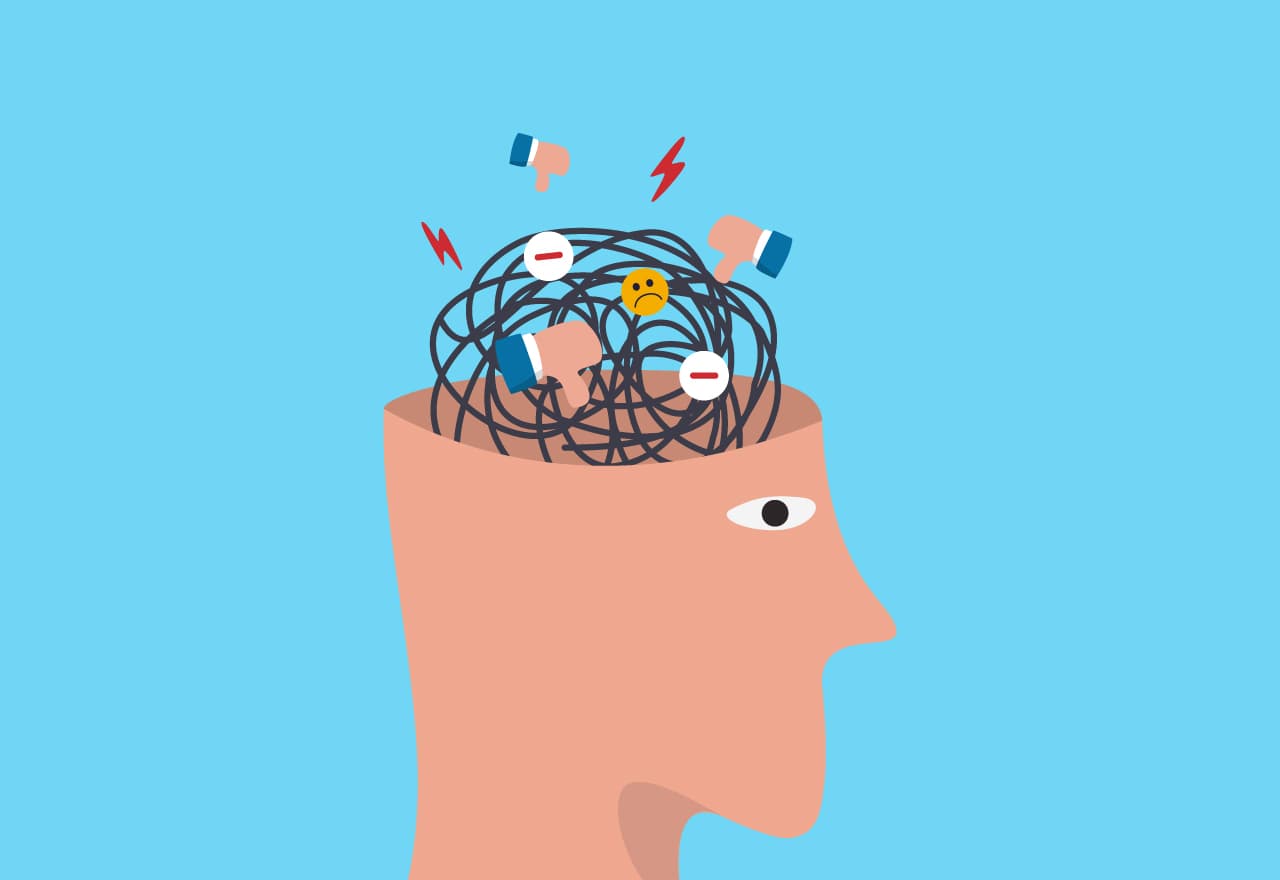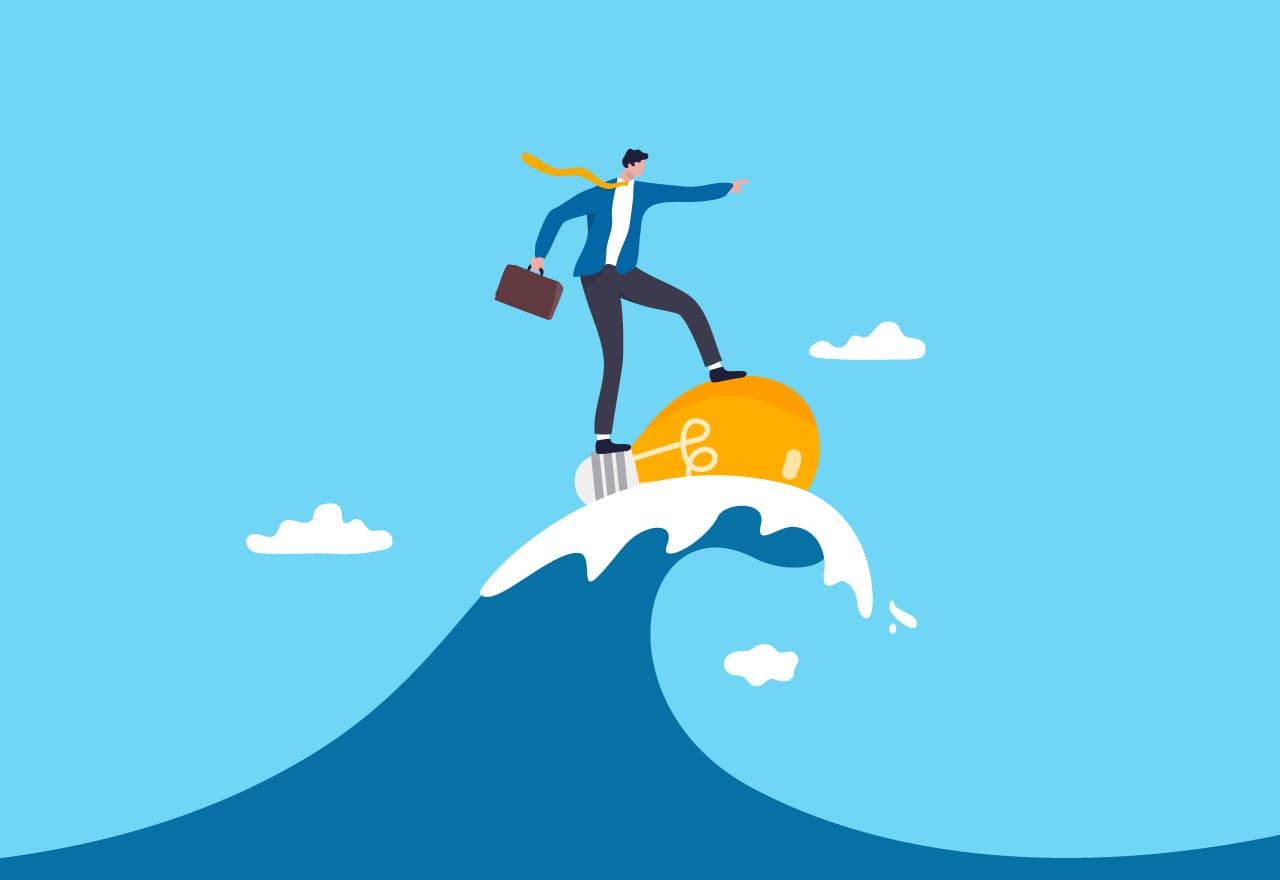Why do we get all our best ideas in the shower? It must've happened to you. There you are, just minding your own business and then suddenly, you're hit with your own brilliance!
Yet come Monday morning, you're sat at your desk, deadlines looming, and nothing is flowing?
It's like knocking on the door to that large looming fortress of your brain and shouting up, 'Do you have any good ideas today?" And your brain looks down from the top window and shouts "NOT TODAY THANK YOU" and angrily slams it shut.
You've hit a brick wall.
And yet, in contrast, last Sunday morning, whilst taking a leisurely shower, it was as if the fortress was having a spring clean. Windows and doors were thrown open, and great ideas were being flung out left, right, and center.
Why do we have some of our best ideas at the most inconvenient times?
Neuroscientists and psychologists are beginning to provide insight into this phenomenon. And it's all down to mind wandering. The exploration of spontaneous thought, and its role in creativity. So, whilst there's plenty of apps and techniques out there for time management. If it's ideas that you're after, there's more to productivity than kanbans and calendar blocking.

What is mind wandering and spontaneous thought?
Mind wandering is often referred to as spontaneous or self-generated thought. It's 'thinking outside the box', and then some.
AKA daydreaming.
Yep, that dreamy pastime we were all told off for in class, is actually really important when it comes to creative thinking.
It describes those moments when our attention drifts away from a specific task, and floats to our internal thoughts, feelings, and memories. When our minds wander, there's an increase in activity in the default network mode area of our brain. And this area has been linked to creativity, self-reflection, recollection, and empathy.
If you think about the six degrees of separation as the idea that all people, are six or fewer connections away from each other. Mind wandering is the unlimited equivalent, but with your memory. It's how our brains can go from thinking about cheese, to ending up at aliens. The first thought, is connected to the last, through a series of associations:
Cheese - mouse - cat - wool - knitting - grandma - stargazing - aliens.
It allows us to connect, and make associations that might not be obvious, without the journey in between.
Why the shower? Why not the office?
Environment plays a crucial role. When our minds aren't focussed on a specific task, it can roam freely through these different cognitive territories.
Studies reveal that the brain's default mode network (DMN) is more active when we let our minds wander, or carry out simple tasks, than when we focus intently. In simple terms, the DMN is where our brain goes when we're not actively thinking.
It's the autopilot of thought.
In a setting like the shower, where your brain isn't occupied with screens, messages, and immediate demands, there's an openness that allows the DMN to be more active. Combine this with the habitual task of washing, something we do every day without paying much attention to it, and you have the prime environment for the mind to wander freely.
In contrast, the office - with its deadlines, scheduled meetings, and notifications - caters more towards the brain's executive systems. Here, focus is key.
But just because the body is at rest doesn't mean the mind is.

The restful mind misnomer:
The connotations of daydreaming or mind wandering have traditionally been negative. Distracting you from meaningful work, disconnecting from reality, there were rumors of laziness.
Daydreaming goes against everything society prescribes. When we look up productivity techniques, it's all about achieving more, managing our time more efficiently and streamlining processes. In fact, we're so busy being productive that we even need a piece of tech to tell us when to move. But perhaps the reason we're not moving enough in the first place, is linked to the perception that doing anything other than being at your desk, means you're not being productive.
Society prescribes that we should engage in the type of thinking that solves problems. There's a preference for a busy mind. But it's a misconception that when your mind is at rest, your brain is doing nothing.
What happens in the DMN...doesn't stay in the DMN.
Kalina Christoff, a cognitive neuroscientist at the University of British Columbia in Vancouver had the idea to look at the brain imaging for people when they were mind-wandering. The participants were asked, "Were you on-task, or off-task during your thoughts?".
The neuroimaging in these tests showed that during 'off-task' thoughts, i.e., mind wandering, not only was the default network activated, but equally activated was the executive system of the brain.
The executive system is crucial for a range of higher-order cognitive functions such as decision-making, problem-solving, and planning.
The executive system wears a high vis, carries a clipboard, and gets stuff done.
It's the part of our brain that works on organizing the sequence of steps to achieve a certain goal. Focusing attention, controlling impulsive behavior, and seamlessly switching focus when needed.
This pairing up of the DMN and the executive system during mind wandering, suggests that even when we believe our minds are 'daydreaming', they might be engaging in deep, analytical thinking.
And herein lies the paradox.
While we perceive daydreaming as 'doing nothing', our brains are very much active and engaged. What's more, this partnership between the default mode network and the executive system can lead to insightful, creative solutions.
One is the yin to the other one's yang.
Together, they form a powerful duo that can lead to breakthroughs, and those moments of brilliance that take us by surprise.
Now, this isn't to say that structured, focused thinking isn't valuable. Quite the contrary, it's essential for executing tasks and working on predefined problems. However, the spontaneous thoughts that arise from mind-wandering offer something that structured thinking often can't - a fresh perspective.
But can you have too much of a good thing?
Is too much mind wandering harmful?

"An idle brain is the devil's playground."
There's also a school of thought that believes an idle mind is a bad thing. While moments of reflection and daydreaming can be beneficial, sometimes it's unwanted and uninvited. And constantly losing yourself in thought can have some drawbacks:
Rumination
Overthinking or dwelling on certain thoughts can intensify feelings of anxiety or sadness. It's like being trapped in a loop of negative thoughts without a clear way out.
Dissociation
Constant daydreaming can disconnect us from our current environment or situation. It's like being physically present but mentally miles away, which can hinder interactions and daily functioning.
Maladaptive Daydreaming
If daydreaming becomes so persistent that it disrupts daily tasks, it's termed "maladaptive daydreaming." It's not just the occasional drift into a pleasant fantasy. It's an intense, often hours-long episode that can hinder daily activities.
Symptoms of Underlying Issues
Excessive daydreaming might be indicative of other conditions. For instance, people with ADHD might find their minds wandering more than others. Similarly, persistent and negative daydreaming can be a symptom of depression.
A wandering mind can be a source of creativity and relaxation. But like all good things, it's best to strike a balance.
5 mind wandering benefits

1: Creativity
Mind wandering facilitates creative incubation. It taps into our stored memories, identifying connections that aren't immediately obvious. By extracting information from our past experiences and suggesting it in new configurations, it offers up unique solutions and fresh ideas.
2: Mood Enhancement
Allowing your mind to drift, not only offers temporary relief from daily stress. But the questions and solutions it can come up with, can be amusing in themselves. A positive mood can also trigger more extensive mind wandering, exposing us to a whole variety of thoughts and ideas.
3: Enhanced Cognitive Flexibility
Life is like a game of dodge ball. And at times you need your wits about you to dodge those curve balls getting thrown your way. Cognitive flexibility refers to our brain's ability to adjust to new situations. By letting our minds wander, we train our brains to simulate and prepare for different scenarios, enhancing our adaptability.
4: Problem-Solving and Innovation
Mind wandering can act as an incubation period for complex problems. In a study exploring the link between mind-wandering and creative problem-solving, participants were given a task. They were asked to think of as many uses as possible for a common object. The goal was to investigate how periods of distraction or "incubation" influenced their creative abilities. Participants who reported higher levels of mind-wandering during the incubation period demonstrated greater creativity in their solutions, especially in terms of flexibility and originality, compared to those with lower reported mind-wandering frequency.
5: Higher Working Memory Capacity
Working memory is like the RAM of our cognitive system - it holds and manipulates information over short periods. People with a higher working memory capacity can engage in more purposeful mind wandering, effectively balancing current tasks and future planning. Research suggests such individuals can switch between tasks more efficiently, optimizing their cognitive performance.
How to navigate your mind wander

Embrace the Wander
Instead of beating yourself up for daydreaming or telling yourself it's a waste of time, take time out to encourage the wander. A 5-minute walk round the block or tackling that washing up could be all you need to open that floodgate.
Tune into Your Thoughts
Thoughts are our mind's building blocks. Not only do they help us climb from one idea to another. But they're hugely influential to our mental wellbeing. Recognise them as they come and go and how they affect your feelings. The most productive and useful forms of mind wandering are when our mood is good. Anything else can lead to ruminative thinking. By being more aware of our thoughts, we can notice if they're helping or hindering us.
Balance the Two
Recognize the value of both structured, focused thinking, and unstructured, spontaneous thinking. And know when to stop. Obviously, mind wandering has no place when driving or operating heavy machinery. Or when your partner is attempting to engage in meaningful conversation with you.
Create the Right Environment
Go wash those dishes, do that ironing, watch that tv programme that flip-flops between guilty pleasure and indefensibly terrible. These are tiny windows of zone-out time, and your mind will thank you for it.




